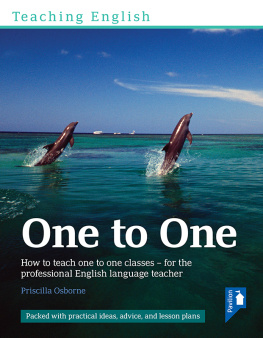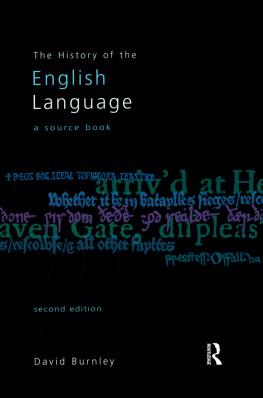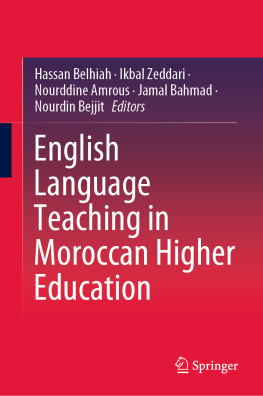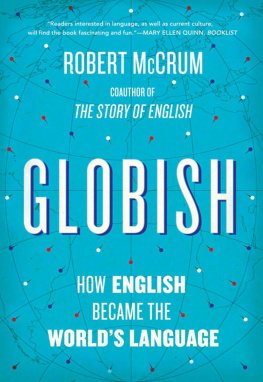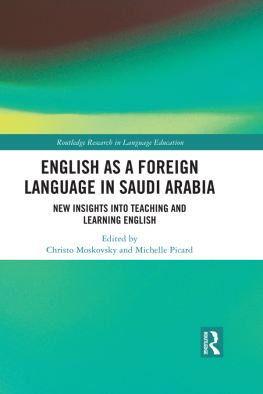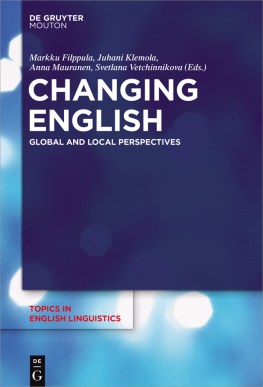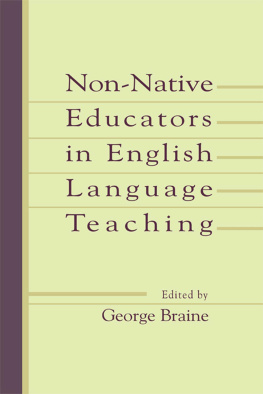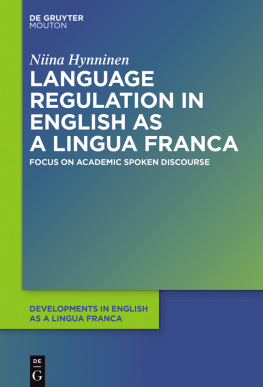LINGUISTIC DIVERSITY AND LANGUAGE RIGHTS
Series Editor: Dr Tove Skutnabb-Kangas, bo Akademi University, Finland
Consulting Advisory Board:
Franois Grin, Universit de Genve, Switzerland
Kathleen Heugh, University of South Australia, Adelaide
Mikls Kontra, Linguistics Institute, Hungarian Academy of Sciences, Budapest
Robert Phillipson, Copenhagen Business School, Denmark
The series seeks to promote multilingualism as a resource, the maintenance of linguistic diversity, and development of and respect for linguistic human rights worldwide through the dissemination of theoretical and empirical research. The series encourages interdisciplinary approaches to language policy, drawing on sociolinguistics, education, sociology, economics, human rights law, political science, as well as anthropology, psychology, and applied language studies.
Full details of all the books in this series and of all our other publications can be found on http://www.multilingual-matters.com, or by writing to Multilingual Matters, St Nicholas House, 31-34 High Street, Bristol BS1 2AW, UK.
Library of Congress Cataloging in Publication Data
A catalog record for this book is available from the Library of Congress.
English Language as Hydra: Its Impacts on Non-English Language Cultures/Edited by Vaughan Rapatahana and Pauline Bunce.
Linguistic Diversity and Language Rights: 9
Includes bibliographical references and index.
1. Languages in contact--Pacific Area. 2. Pacific area--Languages. 3. English language--Foreign coutries. 4. English language--Influence on foreign languages. 5. English language--Political aspects. 6. English language--Social aspects. I. Rapatahana, Vaughan.
II. Bunce, Pauline.
P130.52.P16E54 2012 306.44dc23 2012009135
British Library Cataloguing in Publication Data
A catalogue entry for this book is available from the British Library.
ISBN-13: 978-1-84769-750-9 (hbk)
ISBN-13: 978-1-84769-749-3 (pbk)
Multilingual Matters
UK: St Nicholas House, 31-34 High Street, Bristol BS1 2AW, UK.
USA: UTP, 2250 Military Road, Tonawanda, NY 14150, USA.
Canada: UTP, 5201 Dufferin Street, North York, Ontario M3H 5T8, Canada.
Copyright 2012 Vaughan Rapatahana, Pauline Bunce and the authors of individual chapters.
All rights reserved. No part of this work may be reproduced in any form or by any means without permission in writing from the publisher.
The policy of Multilingual Matters/Channel View Publications is to use papers that are natural, renewable and recyclable products, made from wood grown in sustainable forests. In the manufacturing process of our books, and to further support our policy, preference is given to printers that have FSC and PEFC Chain of Custody certification. The FSC and/or PEFC logos will appear on those books where full certification has been granted to the printer concerned.
Typeset by The Charlesworth Group.
Printed and bound in Great Britain by Short Run Press Ltd.
Contributors
Lalaine F. Yanilla Aquino
Associate Professor, Department of English and Comparative Literature, College of Arts and Letters, University of the Philippines, Diliman, Quezon City, Philippines.
I am Lalaine F. Yanilla Aquino, a Filipino and a Professor of English Studies. I have lived in the Philippines all my life, and I am a product of the Bilingual Education Policy (BEP), in which English is one of the two media of instruction. My first language is Tagalog the language of my father, who is from Tayabas, Quezon. I can comprehend a little Aklanon the language of my mother, who is from Aklan and a little Kapampangan the language of my husband, who is from Pampanga. At home, my husband and I use Filipino in conversing with our children, who are all studying now still under the BEP. My very own linguistic history and experience is a good example of the multilingual country that is the Philippines. Though I have nothing against English being used as a medium of instruction in Philippine schools, I strongly believe that Filipino children have the right to learn the basic concepts and skills (and literacy, as well) initially in their mother tongue. The Philippine government owes it to the Filipino people to give its support, in terms of providing instructional materials, teacher training and other necessary infrastructures, as a recognition of this right.
Xavier Barker
Member of the Nauru Language Committee, ex-Director (Acting), University of the South Pacific campus, Republic of Nauru.
My name is Xavier Barker. I am both an Australian and a Nauruan, who has been educated in Australia and the Pacific. I am currently studying Language Endangerment at Monash University in Melbourne. The shift to English began with my English-teaching father and it has been completed in my childrens generation, who do not know any Nauruan. As both a member of the most recent manifestation of the Nauru Language Committee and as a Campus Coordinator of the University of the South Pacific in Nauru, I have not advocated removing English from Nauruan schools, but I have strongly encouraged the maintenance of Nauruan, alongside the learning of English as a second language. It is important, whilst forging a unique identity for Nauru, which recognizes our past, that we remain pragmatic enough to recognize that English is the most widely spoken Pacific language.
Jeanie Bell
Lecturer, Centre for Australian Languages and Linguistics, Batchelor Institute for Indigenous Tertiary Education, Northern Territory, Australia.
My first language is English, and I identify as a member of the Jagera and Dulingbara clan groups of south-east Queensland, Australia. I use words from a range of Aboriginal languages mixed in with English on a daily basis. I also regularly speak a variety of Aboriginal English. As an adult, I have studied and learnt, from recorded documentation, my heritage language Badjala from Gari (Fraser Island), and while I technically know this language and its grammar, I only use it in limited situations.
Pauline Bunce
English Teacher, Perth, Western Australia; Former teacher-in-charge, secondary classes, Cocos (Keeling) Islands.
My name is Pauline, and I am an out-of-touch Australian with British roots. While Australia is undoubtedly my home, there are often times when I do not necessarily feel at home in the country. I have lived more than half of my life outside mainstream Australian society, in various parts of Asia and in Asian parts of Australia. As a Malay speaker, there are times when I feel almost Asian, and there are other times when I struggle to be fully Australian. Im now teaching English to adolescent new arrivals and refugees in an Australian school. It isnt always easy to live in intersecting worlds, but I wouldnt want it any other way.
Tamati Cairns
Kaumatua, Te iwi o Tuhoe, Aotearoa-New Zealand
My parents, Erina Rotarangi nee Cairns (Tuhoe) and Karaihe Rotarangi (Ngati Raukawa), gave birth to their fourth of 15 siblings (thats me) in Mokai, known as Te Pae o Raukawa, on the floor of my grandmother Teiria and grandfather Rotarangi Hamiltons lounge. Mokai is approximately 30 kilometres north-west of Taupo. By virtue of a decision made by my Grandmother Teiria, I was given to my Koroua and Kuia and raised in the small Mori community of Ruatahuna, in the heart of the Te Urewera homeland. Ruatahuna is surrounded by an aged native forest, known today as the Urewera National Park, and is a valley that supports a small farming and hunting community. Ruatahuna is referred to as the heartland of the Tuhoe people,


